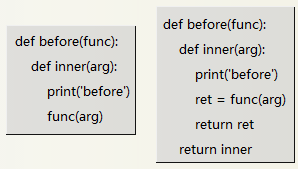1.函数传参时使用当前实参的引用,还是重新创建的值?
答:使用当时实参的引用
2.Python的什么为作用域?
A.缩进的代码块 B.函数
答:B
3.简述深浅拷贝的原理?
答:
4.简述sys.path的作用以及模块命名注意事项
BASE_DIR=os.path.dirname(os.path.dirname(os.path.abspath(__file__)))
sys.path.append(BASE_DIR)
https://zh-google-styleguide.readthedocs.io/en/latest/google-python-styleguide/python_style_rules/#id16
5.简述re模块中match、search以及findall方法的特点
s = """life is short, life is good, life is beauty!"""
print(re.match(r'is', s))
print(re.search(r'is', s))
print(re.findall(r'life is (w+)', s))
print(re.sub(r'life', 'wife', s))
6.写代码实现:

10.书写代码,创建6位的随机验证码(含数字和字母)
1*2+3*4+5*6+7*8...+99*100
7.Python中两种序列化json和pickle的区别
8.
有如下变量。
l1 = ["alex", 123, "eric"]
l2 = ["alex", 123, 'eric']
s1 = """ ["alex", 123, "eric"] """
s2 = """ ["alex", 123, 'eric'] """
请判断以下四个操作是否正确?
a. json.loads(l1)
b. json.loads(l2)
c. json.loads(s1)
d. json.loads(s2)
e. json.dumps(l1)
f. json.dumps(l2)
g. json.dumps(s1)
h. json.dumps(s2)
l1 = ["alex", 123, "eric"]
l2 = ["alex", 123, 'eric']
s1 = """ ["alex", 123, "eric"] """
s2 = """ ["alex", 123, 'eric'] """
请判断以下四个操作是否正确?
a. json.loads(l1)
b. json.loads(l2)
c. json.loads(s1)
d. json.loads(s2)
e. json.dumps(l1)
f. json.dumps(l2)
g. json.dumps(s1)
h. json.dumps(s2)
9.写装饰器
如有一下两个函数,请书写一个装饰器实现在不改变函数调用者的代码基础上,实现在函数执行前后分别打印"before" 和 "after"。
def f1(arg):
return arg + 1
def f2(arg1, arg2):
return arg1 + arg2
def f1(arg):
return arg + 1
def f2(arg1, arg2):
return arg1 + arg2

两种写法区别:
1 def encode(func): 2 def wrapper(*args, **kws): 3 print('encode') 4 func(*args, **kws) 5 return wrapper 6 7 8 @encode 9 def sendMsg(text): 10 print(text) 11 12 if __name__ == '__main__': 13 sendMsg('hello world')
1 def encode(type): 2 def decorator(func): 3 def wrapper(*args, **kws): 4 print('use %d encode' % type) 5 func(*args, **kws) 6 return wrapper 7 return decorator 8 9 10 @encode(1) 11 def sendMsg(text): 12 print(text) 13 14 if __name__ == '__main__': 15 sendMsg('hello world')
首先encode内部有两层函数定义,是一个高阶函数,decorator的定义就是要返回的装饰器函数,encode函数以sendMsg函数为参数,在内部封装一个新函数返回,该函数添加相应的预处理方法encode,可以继续二次调用。(前者)
如果有新的要求,即encode函数自身有参数,一个整形type来表示使用何种加密方法进行加密,这个时候就要修改上述写法,在encode中加一层函数。(后者)
10.书写代码,创建6位的随机验证码(含数字和字母)